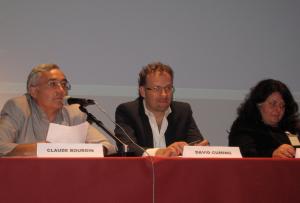 Who has met a farmer in the last week? The last month, or in the past half a year?’ asks Claude Bourdin during the conference. He continues: ‘How much time does it take to buy a packet of raisins from the corner shop? And how long does it take before a grapevine produces its first raisin?’ (Answer: three years).
Who has met a farmer in the last week? The last month, or in the past half a year?’ asks Claude Bourdin during the conference. He continues: ‘How much time does it take to buy a packet of raisins from the corner shop? And how long does it take before a grapevine produces its first raisin?’ (Answer: three years).
The gap between consumers and farmers is often big. And so, too, is the ignorance about farming. This is the message Bourdin wants to deliver. Consumers have a romantic image of the farm, if they have an image at all. Greens often wag their fingers at farmers. The international network Farmers’ Dialogue therefore brings the voice of farmers to this conference on food. Irene de Pous reports:
Farmers shouldn’t be enemies, but brothers. Out of this thought grew the predecessor of the Farmers’ Dialogue in the seventies. When Britain joined the European Economic Community (fore-runner of the European Union) in 1973, there was a lot of tension between the new member and France. Also between the farmers, who were afraid that Britain’s entry would have negative consequences for them.
‘The press was attacking farmers. A Frenchman then visited an English farmer and was surprised to discover how much they had in common,’ tells Bourdin. This informal dialogue became an official international network within Initiatives of Change in 1994.
Potatoes
Although tensions shift – now, for example, they are between the United States and Europe, or between Western farmers and those from developing countries – the idea of building friendly relationships stays the same. Bourdin gives an example of an American soy farmer with 2200 hectares meeting an Ethiopian peasant who has just enough ground to grow his own food. ‘Of course there are huge differences, but nevertheless their basic issues and sense of responsibility to produce food is surprisingly similar.’ Through the exchanges of the Farmers Dialogue, farmers understand that they are not in opposition to each other, but that perhaps farming policies are the cause of friction.
Bourdin, coordinator of the network in France since 1994, says the goal of the Farmers Dialogue is to mobilise farmers. ‘To think together about the role of farmers, and raise their voices.’
Hot potatoes like agricultural subsidies and exports are not avoided. ‘The encounter with farmers from developing countries is an eye-opener for many Western farmers. Now they are the first to recognize the negative effects of food-dumping.’
In the Farmers’ Charter, written in 2001 during a meeting in India, it is therefore proposed that farmers should, as much as possible, produce for their own local surroundings, and that exports with unfair prices is harmful. ‘
Developing countries should be allowed/able to protect their own agriculture, just as Western countries have been doing. These protections could perhaps even help, but surely shouldn’t obstruct.’
Future
‘Usually a farmer is just trying to make it through the day,’ says English dairy farmer Andy Welford. In his absence his son is milking their 180 cows. He therefore calls this conference a good opportunity to step back and reflect. ‘We are part of a global system. Part of my cow feed is probably genetically modified soy from Argentina, and who knows if part of my milk becomes powder for export to Africa.’
After his studies, Welford spent some years in Africa and the Pacific educating farmers, and he has been part of several international farmer networks. He says that in his surroundings idealistic ideas do not particularly prevail. ‘My fellow farmers think of me as quite an oddball. It is all about buying and selling, fixing your tractor and doing everything as cheaply as possible.’
Biological agriculture is a nice alternative, according to Welford, but we have to keep in mind that it never will be mainstream. The Swiss farmer Beat Waber by contrast believes organic farming is the only possibility for the future. Fifty years ago the ‘bio-prophet’ went organic, ‘trying to live according to the bible’, and he still doesn’t regret it.
‘Why is there so much poverty in an activity that the world relies on?’ Three years ago the Farmers’ Dialogue posed this question in a letter to the World Trade Organisation. An urgent question, still to be answered. The food crisis once again shows the importance of farmers. At the same time, in much of the world the rural population is the poorest. Farmers, everywhere, have little to say about the production system they are part of, and often they are not being valued.
The ones who produce our food have the power, you would say. Is it time for a farmers revolution?
For more information on the Farmers Dialogue, click here.
See also: Between Surplus and Hunger: food a crossroad for peace (main conference report), and Environmental Toxins: time to heed the canary's warning (supplementary conference material)



